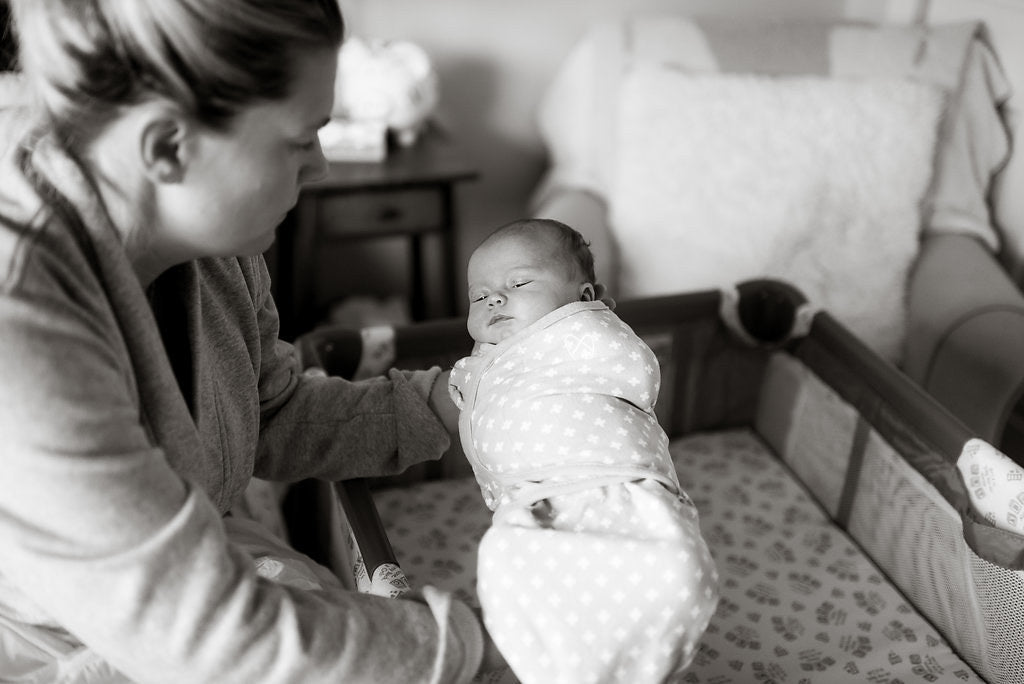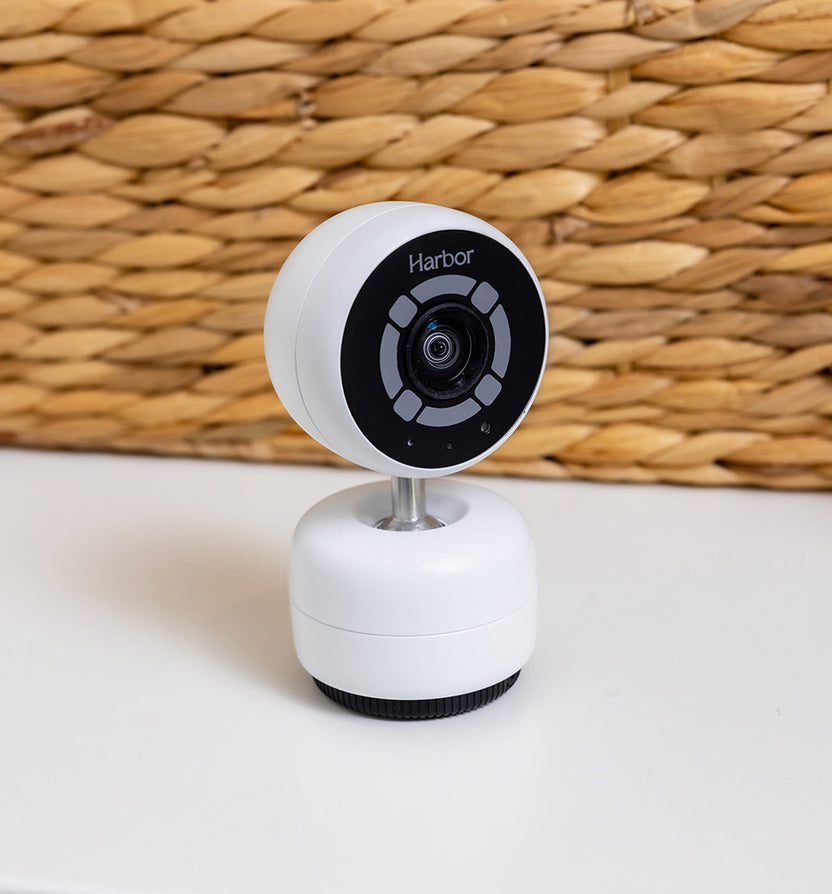
I’m More Tired Than My Kid: Why Parents Still Struggle With Sleep After Baby Sleeps Through the Night
Written by: Dr. Sunita Osborn. Photo courtesy of cribsforkids.org.
Listen to a Guided Rest Meditation ->
I remember craving, wishing, and fantasizing about the moment in which my daughter would finally start sleeping through the night. I saved up all of my wishes and expectations for being a well-rested human again until this moment.
- Once she’s sleeping through the night, my brain won’t feel as foggy.
- Once she’s sleeping through the night, then I’ll start exercising again.
-
Once she’s sleeping through the night, I’ll feel like myself again.
However, that’s not quite what happened. My daughter did start sleeping through the night, but my sleep did not stretch back like a rubber band to its original form. I’d put my daughter to sleep and expect restful bliss, but instead was met with feelings of feeling wired, exhausted, and very much awake even when I didn’t want to be. The adorable barrier to my sleep had finally been managed, why was my sleep still a problem?
It’s a myth that once a baby starts sleeping longer stretches, parents will immediately jump back into longer stretches of sleep themselves. This myth can be harmful as it can create the expectation that something must be wrong with you if your own sleep doesn’t immediately align with your child’s evolving sleep schedule. Because parental sleep challenges don’t disappear the moment your baby sleeps longer stretches. And that’s completely normal. Here's why your body might still be struggling with postpartum sleep, and what you can do to support your own rest.
Why You're Still Exhausted: 3 Common Reasons Parents Struggle With Sleep
1. Parental Vigilance Keeps You Alert
Parental vigilance keeps us awake: Parental vigilance means constantly staying aware - consciously or unconsciously, to keep our kids safe, healthy, and emotionally supported. Even when your child is asleep and safe, this background awareness doesn’t switch off the moment your head hits the pillow.
You’re still attuned to your child’s every sound and movement, which can keep your nervous system in a semi-alert state. That ongoing tension can prevent you from falling asleep or cause you to wake frequently through the night.
2. Sleep Fragmentation Takes a Toll
Sleep fragmentation (frequent nighttime awakenings) can impact your sleep quality more than sleep deprivation itself.
Even if your child is sleeping better now, your body may still be reacting to months (or years) of inconsistent, interrupted sleep. You might be:
-
Waking to check the baby monitor
-
Reacting to phantom cries
-
Sleeping lightly in anticipation of being needed
Research shows that fragmented sleep leads to reduced deep sleep, impaired mood, and decreased cognitive performance—effects that can linger even after your child starts sleeping through the night (Khan-Afridi et al., 2025; Lee et al., 2022). Sound familiar? Don’t worry, you are not alone in this and there is a path forward.
3. Your Body Needs Time to Adjust
Sleep adjustment and recovery takes time: We expect and anticipate that our sleep may need some time to adjust after big changes in our schedule such as starting a new job, school starting, or even after jetlag.
Even when baby starts sleeping well, your internal clock (aka the suprachiasmatic nucleus) just magically flips back to accommodate our new schedule. It can take weeks of consistent cues to re-regulate your sleep patterns (Gallaher, 2018).
If you’ve hit the milestone of longer baby sleep but you’re still wide awake at 2 a.m., you’re not broken.
You’re recalibrating.
Here’s how to gently guide your system back to rest.
How to Support Your Own Sleep After Baby Sleeps Through the Night
So if you’ve reached the highly anticipated and hard won moment of your baby sleeping longer but you're still staring at the ceiling at 2 a.m., you're not doing anything wrong—your body just needs time and support to recalibrate. The good news is that with small, intentional shifts, you can help guide your system back toward deeper, more restful sleep. Here are a few ways to start rebuilding your sleep habits.
Focus on Rest, Not Sleep
Have you ever had those moments where you are lying awake at night desperately trying to convince yourself to fall asleep? The mental energy you are expending can feel like trying to push a boulder up a mountain, but somehow still not exhausting enough to actually make yourself fall asleep. If you find yourself awake and unable to fall asleep, shift your focus to inviting your body to rest.
Consider how to make yourself more comfortable and even imagine yourself laying more deeply into the bed. Sometimes, simply allowing yourself to rest—without pressure to fall asleep—can be the very thing that gently leads you back to sleep.
Create Your Own Bedtime Routine
Consider how much effort you’ve put into developing, evolving, and creating your child’s night routine. You may have experimented with different sleep sacs, different white sound machine settings, and the exact degree of darkness in the room. How much effort do you put towards your own sleep routine? What if you put even 10% of the kind of effort you put into your child’s routine into your own? Not only could this feel like a loving act of self-care, consistent sleep cues, habits, and behaviors all create the conditions for improved quality sleep. Win-win.
Establish a wind-down ritual that tells your brain it’s time to sleep:
-
Dim the lights
-
Play calming music
-
Take a warm shower or do light stretching
-
Avoid screens 30 minutes before bed
Adjust Your Daytime Rhythms
While it is important to consider how to make your nighttime routine as sleep supportive as possible, it’s also just as important to consider what you are doing during the day and how that impacts your sleep. The amount of sunlight we get, the amount of energy we expend, and the food we eat all can impact the amount and quality of sleep we get. Allow yourself to zoom out and consider one small area that you can adjust during the day to help your sleep. Perhaps, you set up the baby blanket outside to get five more minutes of sunshine in the morning or you walk to the playground rather than drive to expend a little more energy.
Try one small shift:
-
Get 5 minutes of early-morning sunlight
-
Take a walk with the stroller instead of driving
-
Cut caffeine after 2 p.m.
These tiny adjustments support your circadian rhythm and help rebuild your energy naturally.
Ask for Support
Sometimes we can have all the variables in place and still find ourselves waking up at night to check the monitor or even if we have ideas on how to improve our sleep, it’s not feasible with our current schedule or lifestyle.
If possible, include your support person and see if they can be in charge of the monitor, in charge of a certain night, or even just let them know the sleep habits you are trying to introduce to receive some encouragement and gentle accountability.
As with so many aspects of parenting, we are not meant to do this alone and if you find yourself continuing to struggle to get quality sleep, even when you have the opportunity to do so, know that professional help is not only okay - it can be a powerful step towards reclaiming and honoring your own needs.
Sleep Resources for Parents, Too
It seems like there are infinite books, podcasts, and blogs out there on the topic of helping your children sleep. Those are necessary and helpful because having our babies sleep puts us one step closer to getting the rest we need. However, we also deserve intentional thought, care, and support when it comes to rebuilding our sleep habits throughout the early years of parenting and beyond.
This is particularly true as we know that early childhood comes with many sleep milestones and disruptions and we may find ourselves in the position of resetting our sleep habits again and again as our children develop.
Your rest matters too, and reclaiming it is not a luxury, it’s a vital part of your well-being in this ever-evolving journey of parenthood.
Resources & Support
-
In crisis? Text HOME to 741741 to connect with a trained counselor
-
Feeling overwhelmed? Contact the PSI helpline at 800.944.4773 or visit Postpartum Support International
Note: This article is for educational purposes and does not replace professional medical advice.
References:
-
Gallaher, K. G. H., Slyepchenko, A., Frey, B. N., Urstad, K., & Dørheim, S. K. (2018). The role of circadian rhythms in postpartum sleep and mood. Sleep medicine clinics, 13(3), 359-374.
-
Lee, V. V., Schembri, R., Jordan, A. S., & Jackson, M. L. (2022). The independent effects of sleep deprivation and sleep fragmentation on processing of emotional information. Behavioural brain research, 424, 113802.
-
Khan-Afridi, Z., Ruchat, S. M., Jones, P. A., Ali, M. U., Matenchuk, B. A., Leonard, S., ... & Davenport, M. H. (2025). Impact of sleep on postpartum health outcomes: a systematic review and meta-analysis. British Journal of Sports Medicine, 59(8), 584-593.




